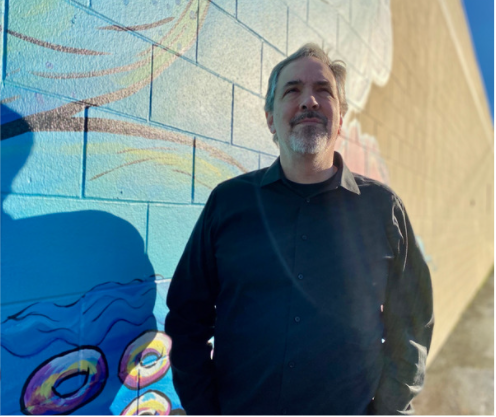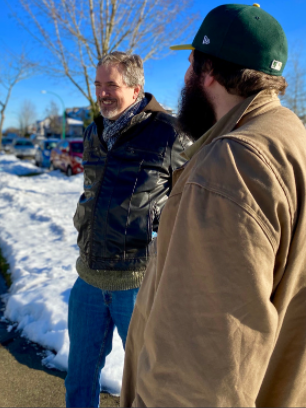OUR MISSION
We help men who feel stuck break free of the BS stories that have been holding them back so that they can embark on the journey of more meaning, connection, and joy in their life.
Here’s the official bio
Scott Swanson is a congregational minister, transformational and leadership coach, educator, writer, speaker, spiritual director, and group facilitator. He has a passion for witnessing and facilitating those moments of insight that lead individuals and organizations toward achieving healing, greater wholeness, and their own deeper purpose.
Scott holds a Bachelor of Arts degree (Western Washington), an MA in English Literature (Victoria) and a Master of Divinity (Vancouver School of Theology.) Ordained by The United Church of Canada in 1998, he has worked in a variety of ministry settings in BC and Manitoba. For 11 years beginning in 2008, Scott specialized in Intentional Interim ministry. But really, all congregational ministry now in transitional in one sense or another.
Scott worked with men as a military and prison chaplain, and for 2 years through a part-time men’s ministry he initiated called Manifest. He also holds certificates in spiritual direction (Pacific Jubilee) and coaching (Justice Institute of BC) and works privately with women and men, clergy and lay, as a coach and spiritual director.
His hybrid technique draws on his training and experience in the fields of coaching, educational supervision, pastoral care, and spiritual direction, as well as his understanding of Myers-Briggs typologies (he is a certified MBTI practitioner) and the Enneagram. He brings a combination of insight, creativity, thoughtfulness, and curiosity about others to his work.

Here’s the real bio:
I have heard more and more stories in these last few months 2023 of ministry colleagues who are struggling under the weight of what their life and work is asking of them. After years of organizational decline, a pandemic, and a world that seems to be coming increasingly unglued, how could they not be?
I get it. I’ve been there. And my own journey over the last few years has given me something to offer that can help.
It didn’t take very long after I was ordained and settled in full-time congregational ministry in 1998 for me to arrive at a critical insight. All the work I had been asked to do as a student on articulating my call, developing a sophisticated theology of the practice of ministry, etc. … the congregations I was serving didn’t really care.
And why should they? They had been doing church in their own ways for years. I had not thought through the implications of the unconscious assumption that they were somehow just waiting for me to show up and finally tell them what they should be doing and thinking.
I don’t blame (anymore) the denominational elder of formidable reputation who told my young theologue self how important it was that I develop a “vision for the church.” I don’t even blame myself (anymore) for believing him. What’s more, the vision either one of us might have articulated back then for the church’s future might seem quaint now anyway.
Several more years passed when another insight dawned on me: church didn’t appear to change people. As Richard Rohr has said, too often religion does a better job of confirming us at our present level of development rather than really inviting us into the work of transformation.
The gap between my “why” for entering ministry and my “what and how” of congregational life was growing uncomfortably wide, too much to sustain by sheer force of will.
I carried on in congregational ministry, making several changes in an effort to find a “sweet spot,” but nothing I tried ultimately brought me the sense of fit I was looking for. After a protracted period of burnout, a medical leave that was really too short to accomplish much, and a particularly difficult posting that happened to coincide with the pandemic, I was d.o.n.e.
Except I wasn’t. I hobbled along working part time while I tried to build a parachute in a private practice working with men that would finally allow me to leave congregational ministry for good.
For probably a whole much of reasons, that didn’t work out the way I hoped it would. But through the next couple of years I found ways to make peace with my calling to congregational ministry. I also continued to build my skills as a leadership coach and spiritual director.
Here’s what I have that can help:
- Years of cultivating practices of deep listening and asking powerful questions in my roles as a pastor, educational supervisor, transitional minister, spiritual director, and leadership coach;
- years of hosting small group conversations in person and online, learning the power of community to create a container strong enough to hold the messiness of life;
- years of immersing myself in psychology, spirituality, philosophy, leadership, organizational change, and an undying interest in the question of what it is to be human;
- more than 25 years (and counting) in congregational ministry …
… and a mission to help religious leaders reconnect their sense of vocation with how they live and work so that they can move beyond disillusionment and burnout to clarity about what is theirs to do in this new context.
yet I wasn’t willing to give up on my dream.
Through the next number of months, I had several realizations that changed everything for me:

Storytelling occurs at our most basic experience of navigating the world, yet most of the time, we aren’t even aware of ourselves doing it.

Our ingrained pattern-seeking tendencies often cause us to misjudge our experience and misjudge character, as well as mis-remember events from our past.

This awareness of our habits and patterns creates enough freedom to imagine new stories – new ways of thinking about our experience. And when we change the stories we tell ourselves, we can change the way we see the world and ourselves within it.
Now I’m living my dream of helping men examine the stories they tell.
I’m showing them how to create new and better stories that align with their deepest values.
I’m showing them how to lean into those stories in ways that make their lives better.
Which means I never have to worry about burning out or struggling to find my purpose again.
I want to show you how to transform your feeling of being stuck so that you can release freedom, creativity and renewed purpose for the second half of your life.

